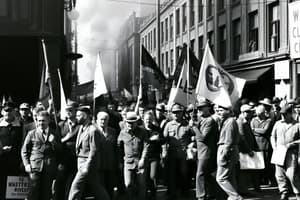Podcast
Questions and Answers
In which year was the article 'The Acephalous Society and the Indirect Rule System in Africa' published?
In which year was the article 'The Acephalous Society and the Indirect Rule System in Africa' published?
- 1996
- 1992
- 1998
- 1994 (correct)
Which publication is cited in reference 3?
Which publication is cited in reference 3?
- Halsbury's Laws of England
- Bernstein's Handbook of Arbitration and Dispute Resolution Practice (correct)
- Law and Practice of Arbitration and Conciliation in Nigeria
- Arbitration in International Trade
In which year was the book 'Law and Practice of Arbitration and Conciliation in Nigeria' published?
In which year was the book 'Law and Practice of Arbitration and Conciliation in Nigeria' published?
- 1995
- 1997
- 1999 (correct)
- 2001
What is the title of the article cited in reference 7?
What is the title of the article cited in reference 7?
Which publication is cited in reference 10?
Which publication is cited in reference 10?
What is the title of the book cited in reference 5?
What is the title of the book cited in reference 5?
In which year was the article cited in reference 8 accessed?
In which year was the article cited in reference 8 accessed?
What is the title of the book cited in reference 6?
What is the title of the book cited in reference 6?
In which year was the Arbitration and Mediation Act cited in reference 9?
In which year was the Arbitration and Mediation Act cited in reference 9?
Who is the author of the article cited in reference 1?
Who is the author of the article cited in reference 1?
Study Notes
Industrial Disputes and Arbitration
- Industrial disputes in Nigeria must be referred to the Industrial Arbitration Panel (IAP) before being taken to the National Industrial Court (NIC), if the IAP is unable to resolve the dispute.
- Football disputes in Nigeria must be submitted to Arbitration under the Nigerian Football Federation (NFF) Rules and Nigerian Premier League (NPL) Rules, as mandated by the Federation of International Football Association (FIFA).
Customary Arbitration
- Customary arbitration involves the settlement of disputes between parties who voluntarily submit to the decision of traditional elders or chiefs of the community.
- The nature of disputes settled by customary arbitration include family disputes, sale of land under customary law, chieftaincy disputes, and landlord and tenant disputes.
- Customary arbitration and/or customary arbitral awards in Nigeria have been given judicial support by the Supreme Court.
- For a customary arbitral award to be binding on the parties, the following elements must be pleaded and established:
- Voluntary submission of the matter in dispute to an arbitration of one or more persons.
- Agreement by the parties that the decision of the arbitration will be accepted as final and binding.
- The arbitration was in accordance with the custom of the parties or their trade or business.
- The arbitrators reached a decision and published their award.
- The decision or award was accepted at the time it was made.
Industrial Arbitration
- Industrial arbitration is the submission of a trade dispute to the Industrial Arbitration Panel in line with the provisions of the Trade Dispute Act, Cap T8, Laws of the Federation of Nigeria, 2004.
Commercial Arbitration
- Commercial arbitration is governed by the Arbitration and Mediation Act.
- The Arbitration and Mediation Act defines 'arbitration' as 'Commercial arbitration whether or not administered by a permanent arbitral institution'.
Effect of Arbitration Agreement
- Arbitration agreements between parties for settlement of disputes shall be binding on the parties and enforceable against each of the parties to the exclusion of any other dispute resolution method, unless the parties otherwise provide or the agreement is void.
- Arbitration agreements operate on the principle of pacta sunt servanda, meaning 'agreements must be kept'.
Advantages of Arbitration
- Arbitration permits some disputes to be resolved solely on documents, without a hearing, saving time and money.
- Parties can represent themselves in arbitral proceedings or be represented by other persons of their choice.
- Arbitration allows for the selection of experts to look into disputes on matters in which they are proficient.
- Arbitration takes care of the convenience of the parties and their witnesses in fixing the date, time, and place of hearing.
- Arbitration is less formal than litigation, allowing parties to be more relaxed in arbitral proceedings.
- Arbitration allows for 'neutralization' of a dispute by agreeing to refer the dispute to a private but consensually appointed third party.
- The decision of an arbitral tribunal is final and binding on the parties, and consequently, an arbitral award is not subject to appeal.
Studying That Suits You
Use AI to generate personalized quizzes and flashcards to suit your learning preferences.
Description
This quiz covers the laws and procedures for resolving industrial disputes in Nigeria, including the role of the Industrial Arbitration Panel and the National Industrial Court. It also touches on the resolution of football disputes under the Nigerian Football Federation and Premier League rules.




